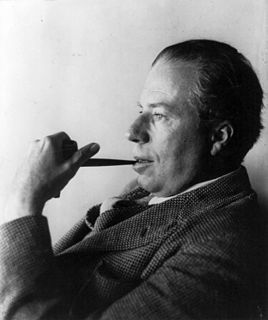A Quote by Horace Mann
Man ... has an inborn religious sentiment that whispers of a God to his inmost soul, as a shell taken from the deep yet echoes forever the ocean's roar.
Related Quotes
It is God's earth out of which man is taken. From it he has his body. His body belongs to his essential being. Man's body is not his prison, his shell his exterior, but man himself. Man does not "have" a body; he does not "have" a soul; rather he "is" body and soul. Man in the beginning is really his body. He is one. He is his body, as Christ is completely his body, as the Church is the body of Christ
The God of Christians is a God of love and comfort, a God who fills the soul and heart of those whom he possesses, a God who makes them conscious of their inward wretchedness, and his infinite mercy; who unites himself to their inmost soul, who fills it with humility and joy, with confidence and love, who renders them incapable of any other end than himself.
A man is born into this world with only a tiny spark of goodness in him. The spark is God, it is the soul; the rest is ugliness and evil, a shell. The spark must be guarded like a treasure, it must be nurtured, it must be fanned into flame. It must learn to seek out other sparks, it must dominate the shell. Anything can be a shell, Reuven. Anything. Indifference, laziness, brutality, and genius. Yes, even a great mind can be a shell and choke the spark.
To no man does the earth mean so much as to the soldier. When he presses himself down upon her long and powerfully, when he buries his face and his limbs deep in her from the fear of death by shell-fire, then she is his only friend, his brother, his mother; he stifles his terror and his cries in her silence and her security; she shelters him and releases him for ten seconds to live, to run, ten seconds of life; receives him again and again and often forever.
It is that the Spirit is the outbreathing of God, His inmost life going forth in a personal form to quicken. When we receive the Holy Spirit, we receive the inmost life of God Himself to dwell in a personal way in us. When we really grasp this thought, it is overwhelming in its solemnity. Just stop and think what it means to have the inmost life of that infinite and eternal Being whom we call God, dwelling in a personal way in you. How solemn and how awful and yet unspeakably glorious life becomes when we realize this.
Feuerbach ... recognizes ... "even love, in itself the truest, most inward sentiment, becomes an obscure, illusory one through religiousness, since religious love loves man only for God's sake, therefore loves man only apparently, but in truth God only." Is this different with moral love? Does it love the man, this man for this man's sake, or for morality's sake, for Man's sake, and so-for homo homini Deus-for God's sake?
Faith is from within; it is the outbreaking of human spontaneity; it is force of soul, grandeur of sentiment, magnanimity, generosity, courage. Its formulas are naturally unintelligible in their literal tenor; for, otherwise, they would represent that which is scientifically known, and would not be the mere provisional clothing of that which is not objectively given, but subjectively projected from the inmost depth of the soul.
By His gracious condescension God became man and is called man for the sake of man and by exchanging His condition for ours revealed the power that elevates man to God through his love for God and brings God down to man because of His love for man. By this blessed inversion, man is made God by divinization and God is made man by hominization. For the Word of God and God wills always and in all things to accomplish the mystery of His embodiment.





































